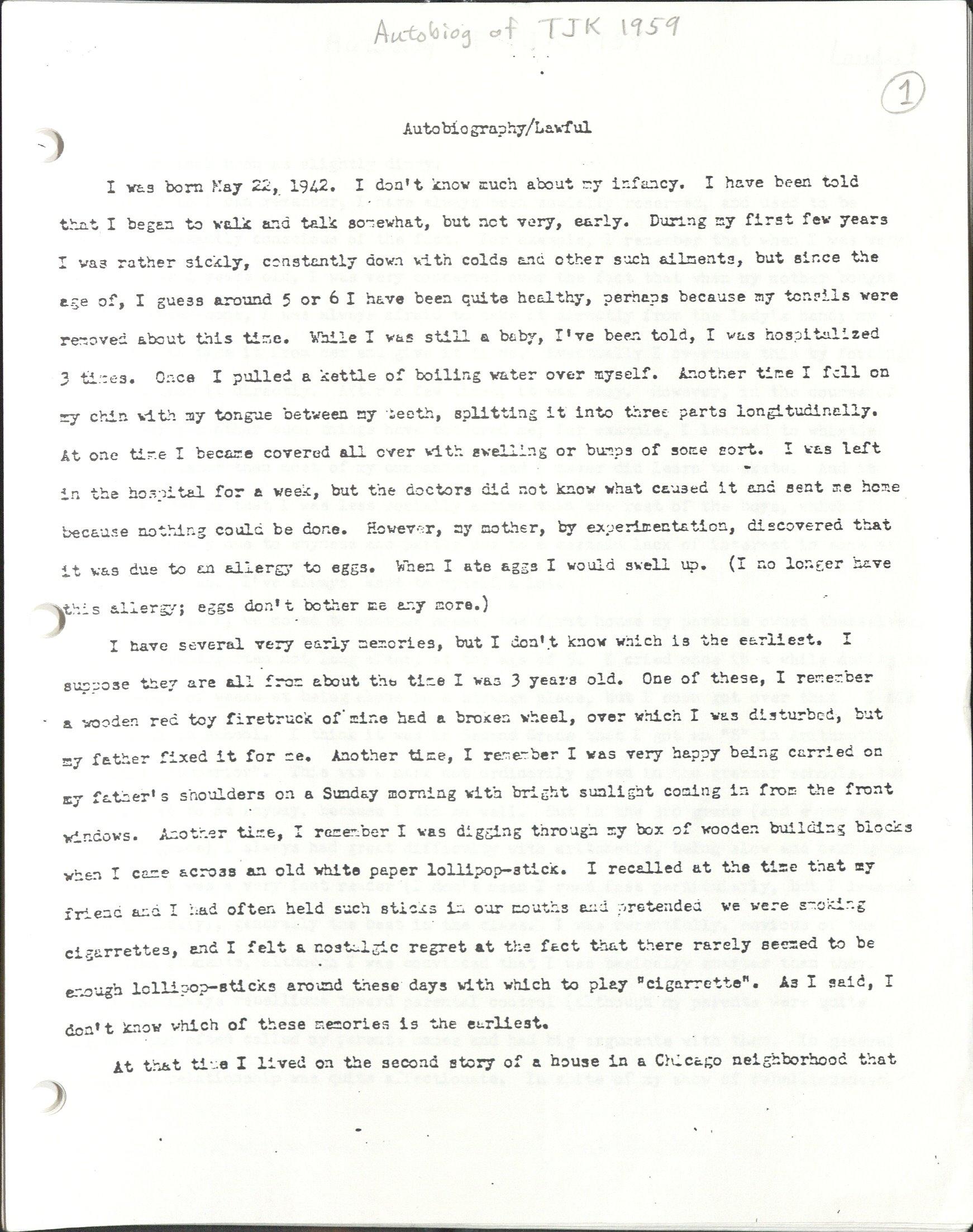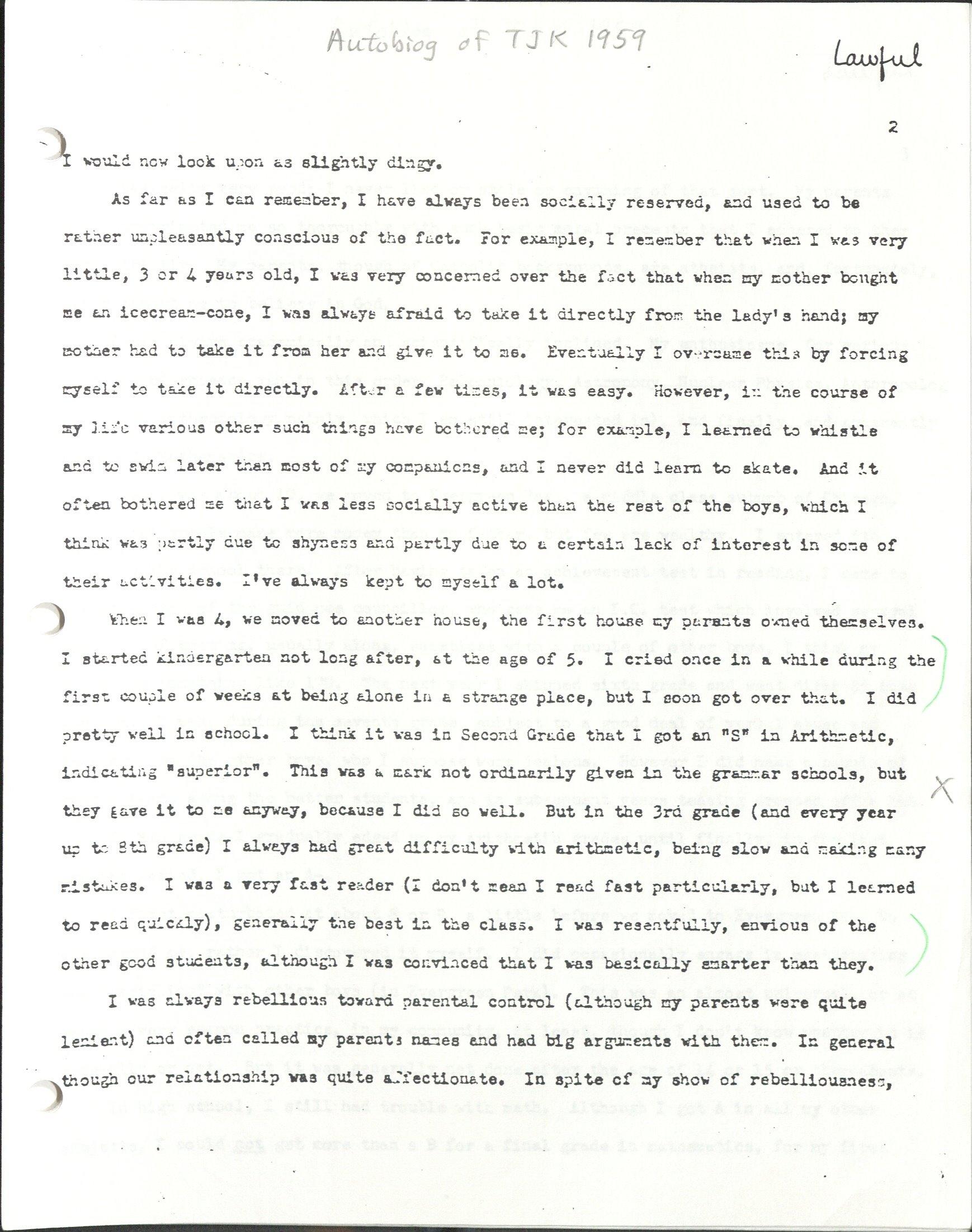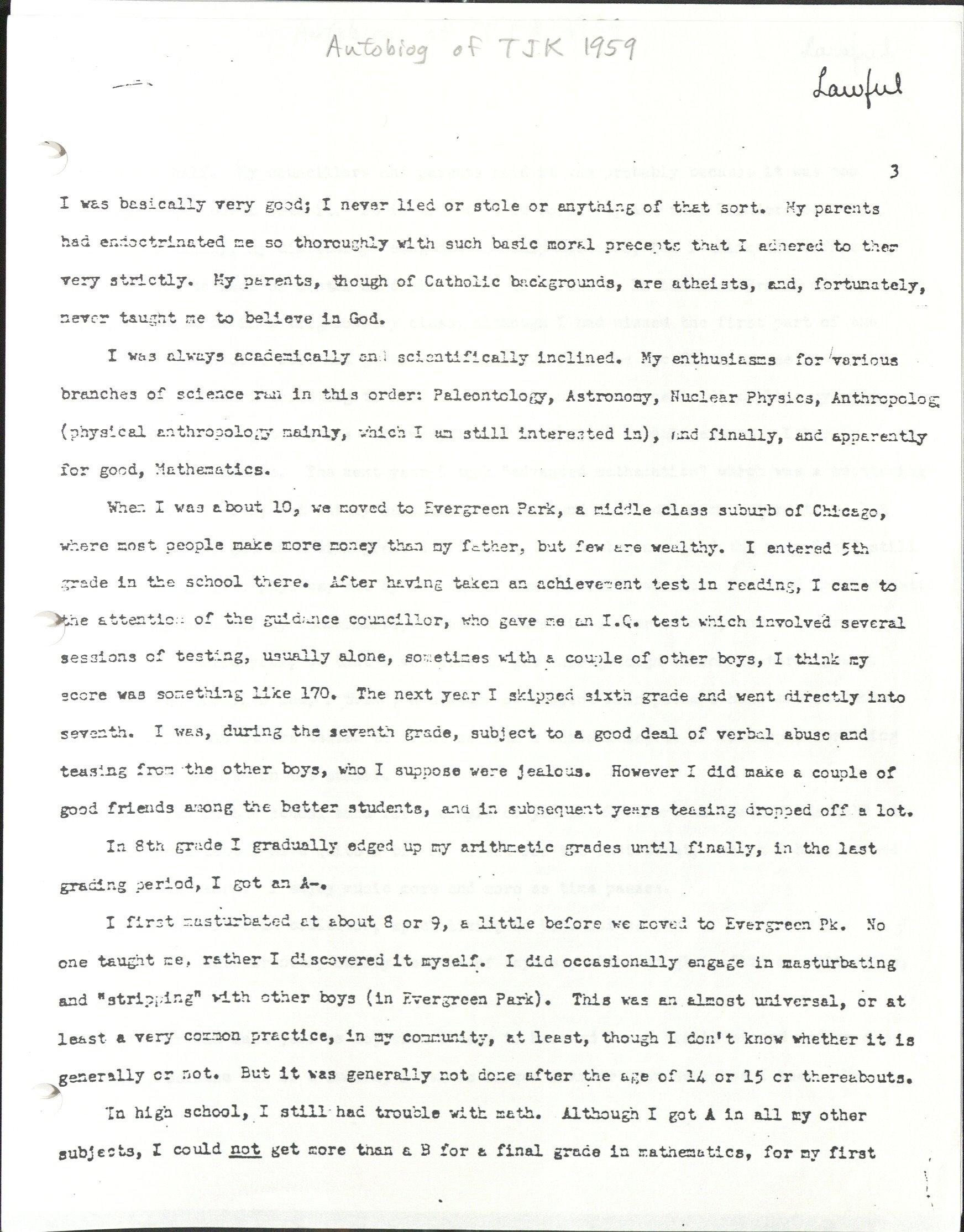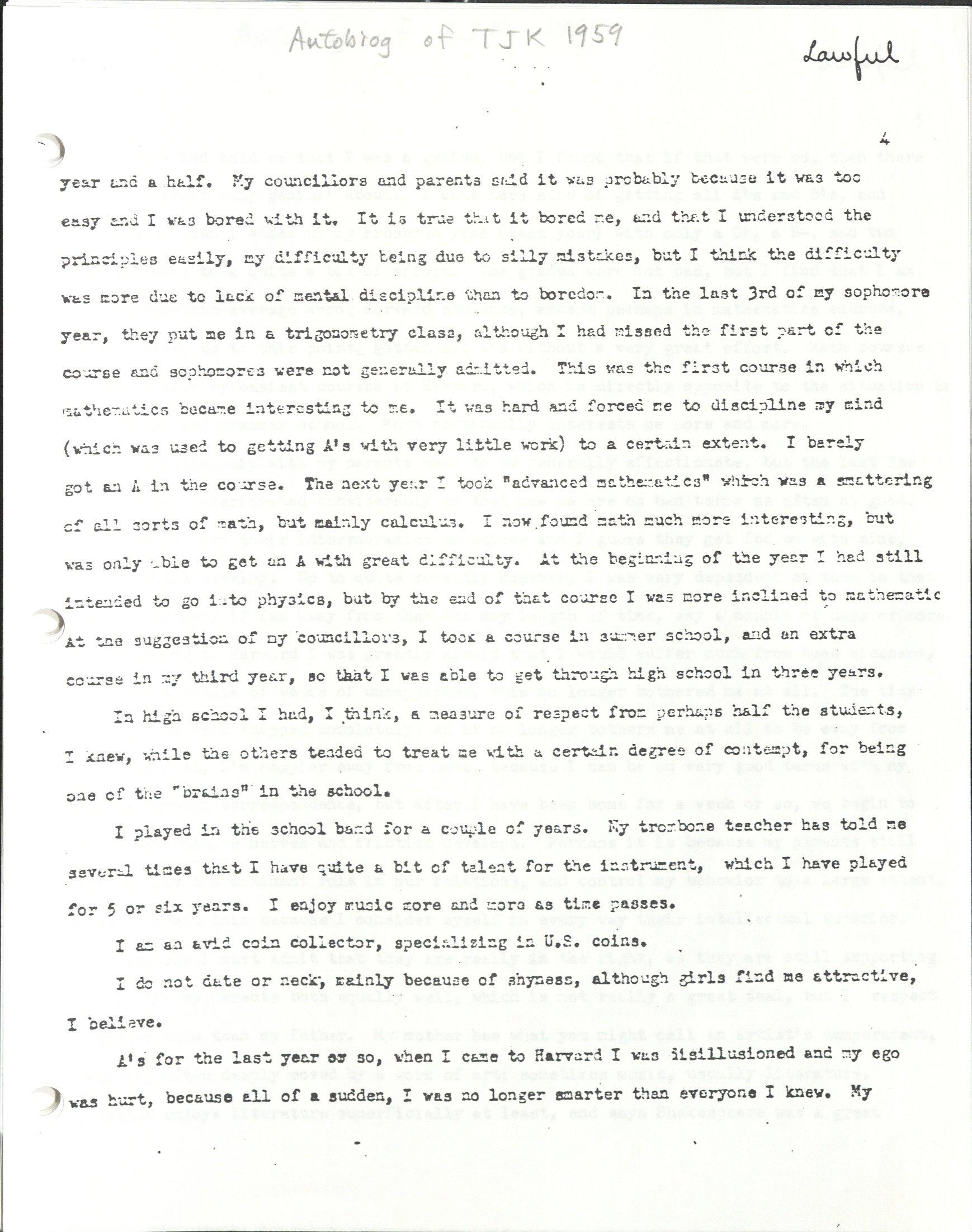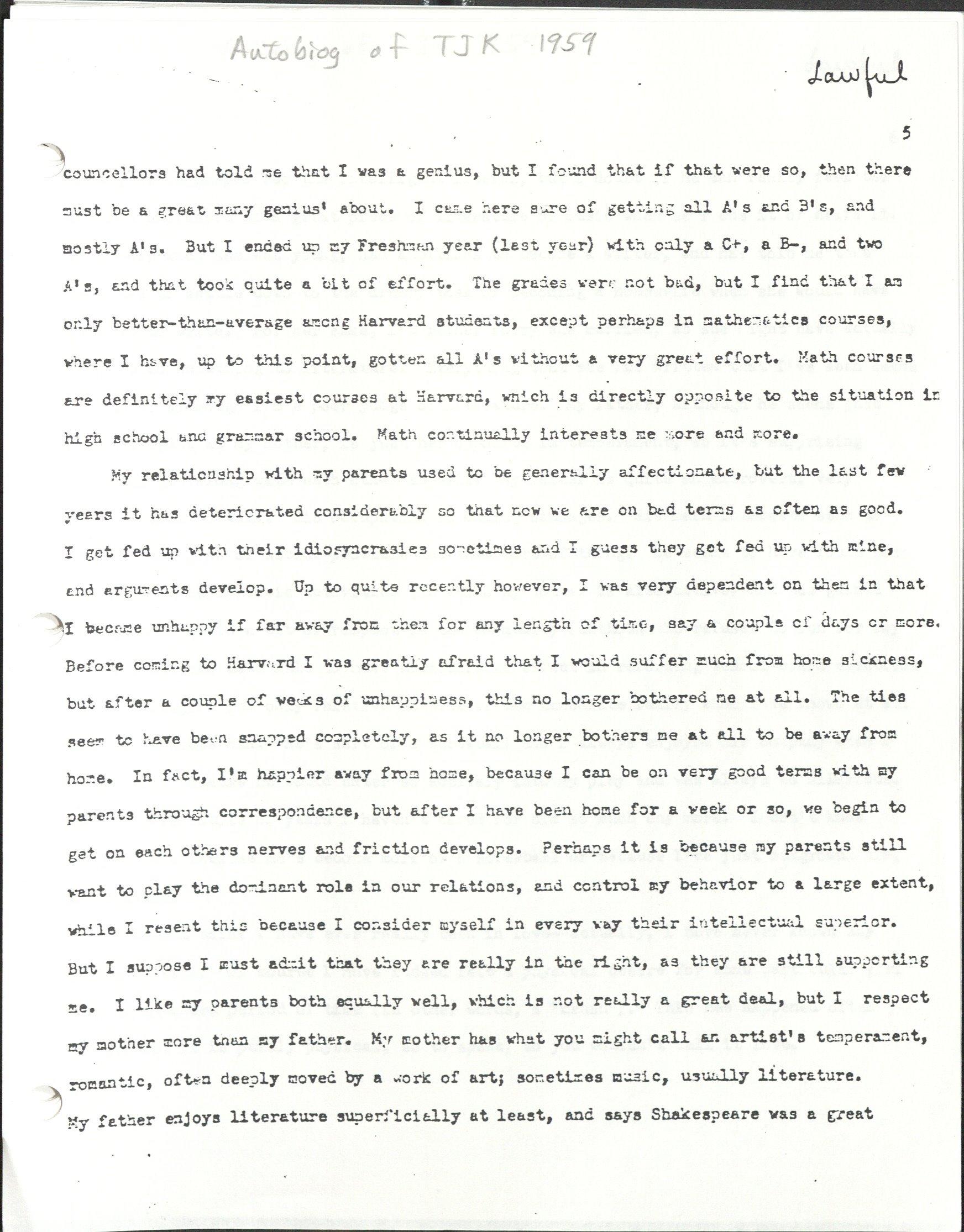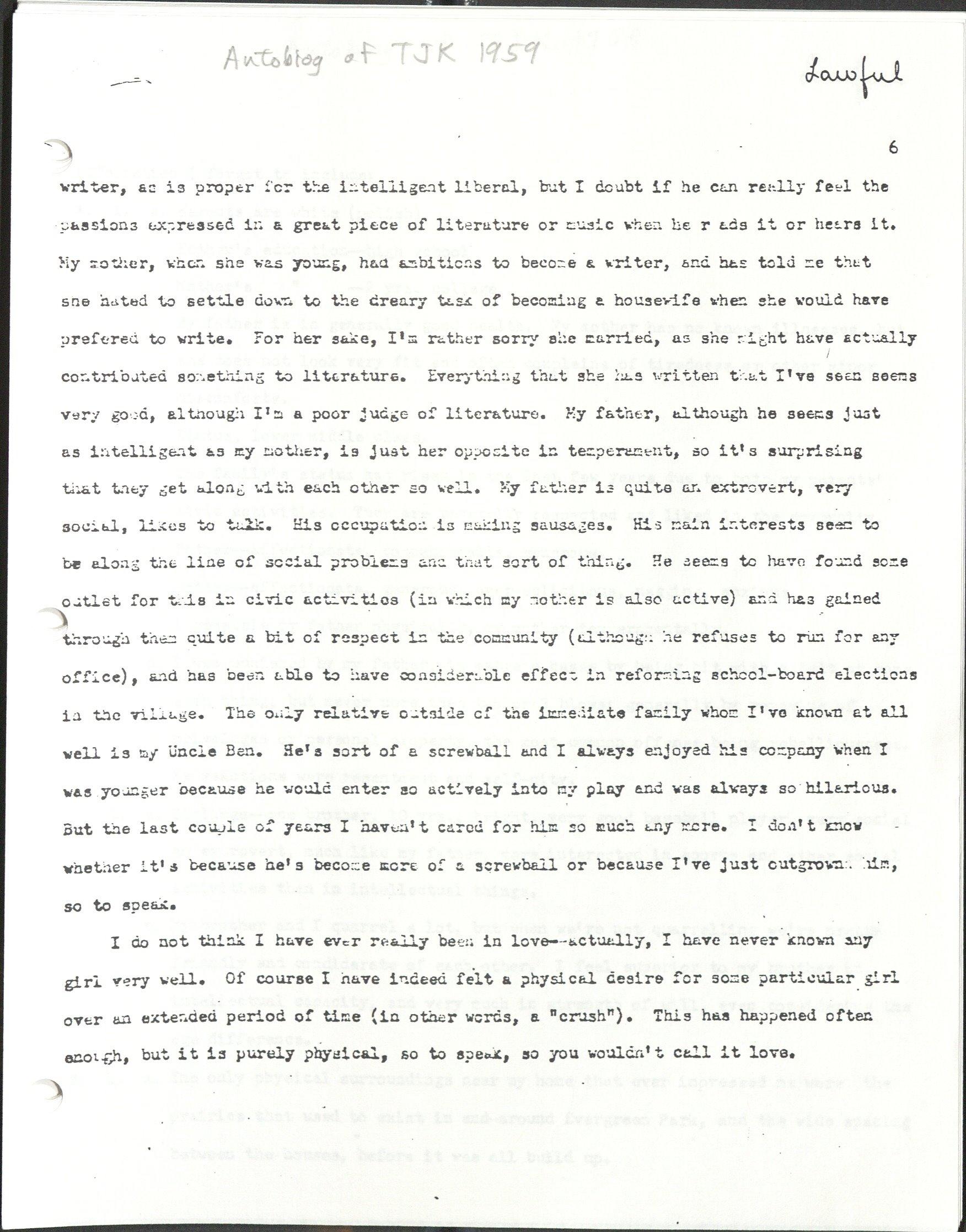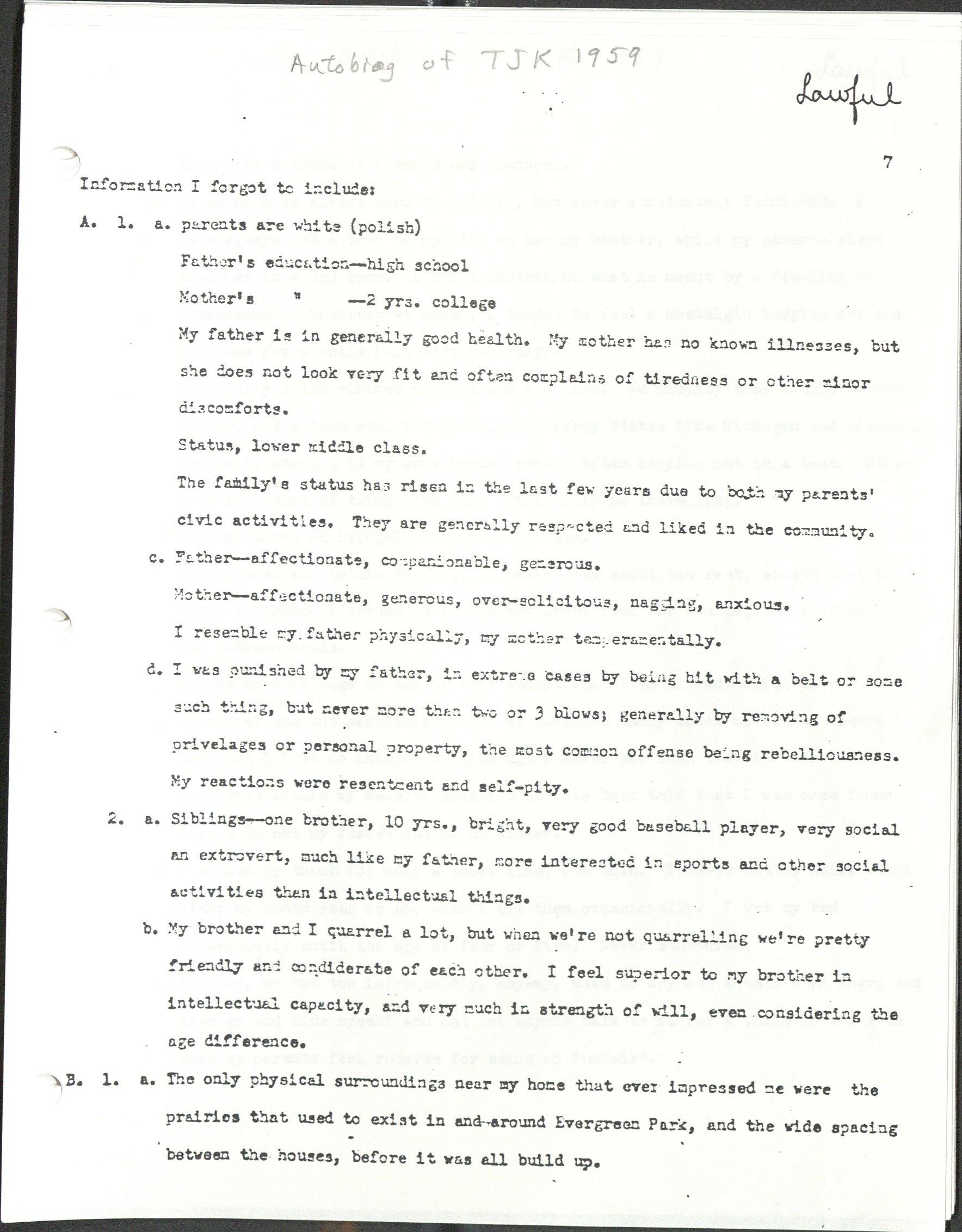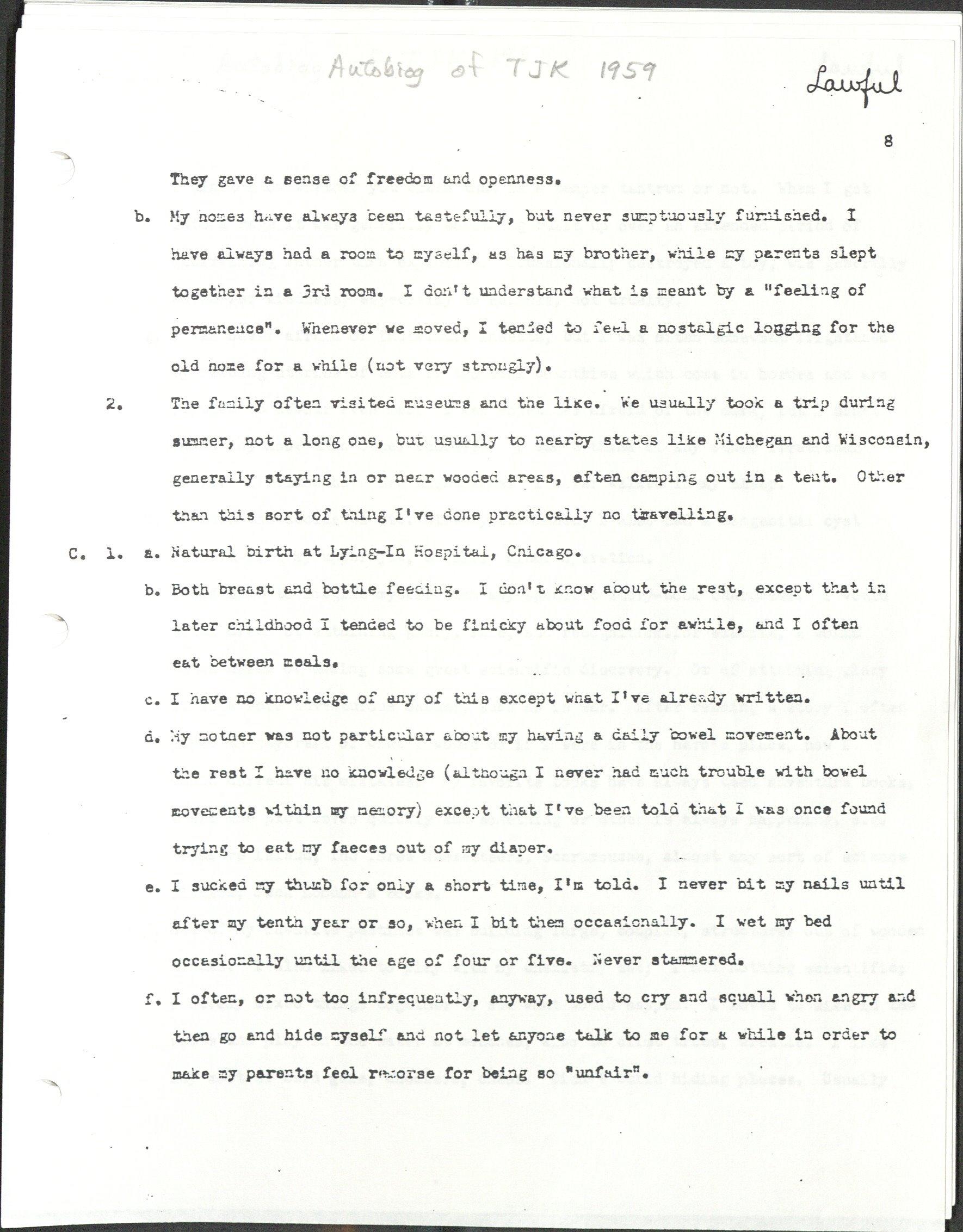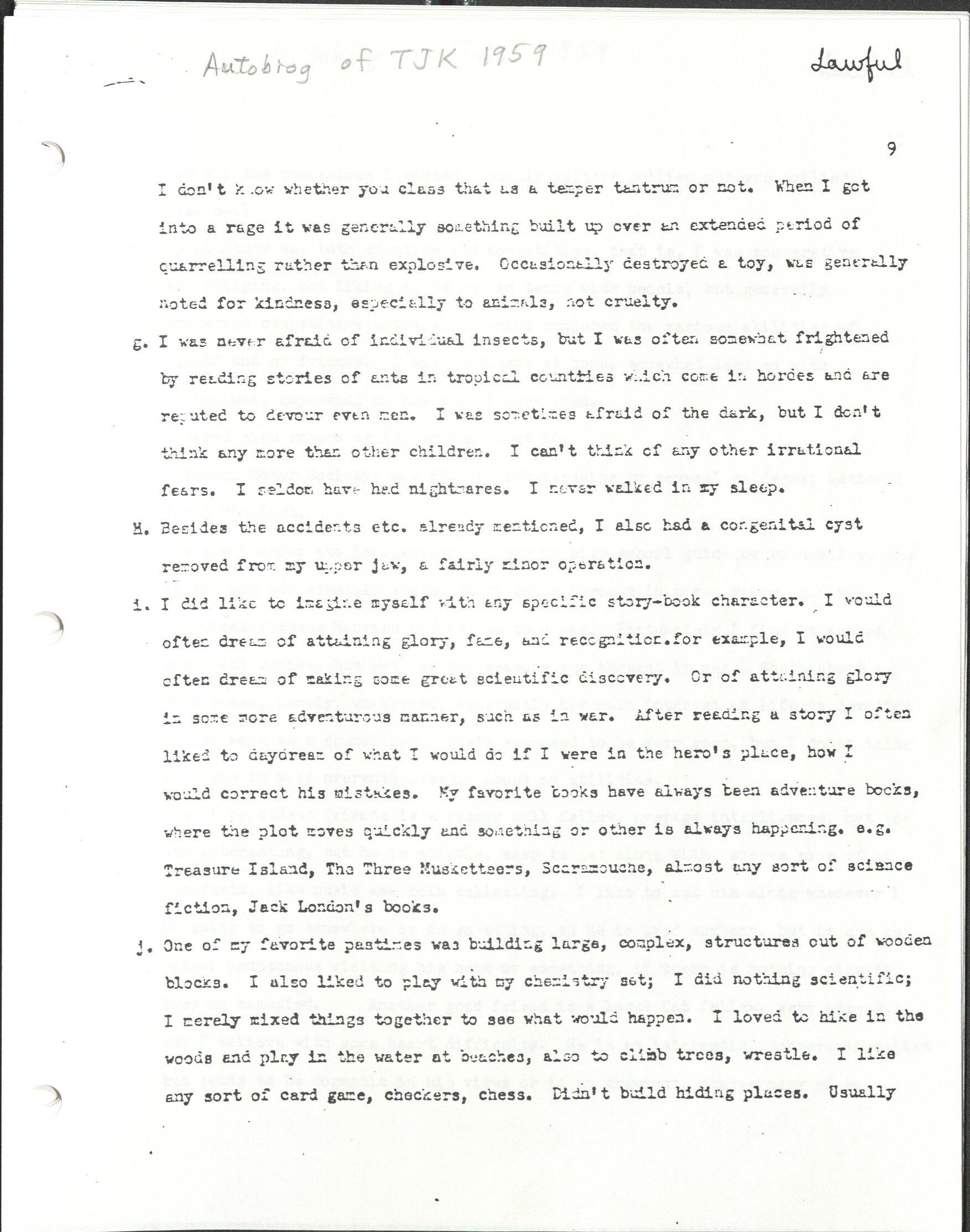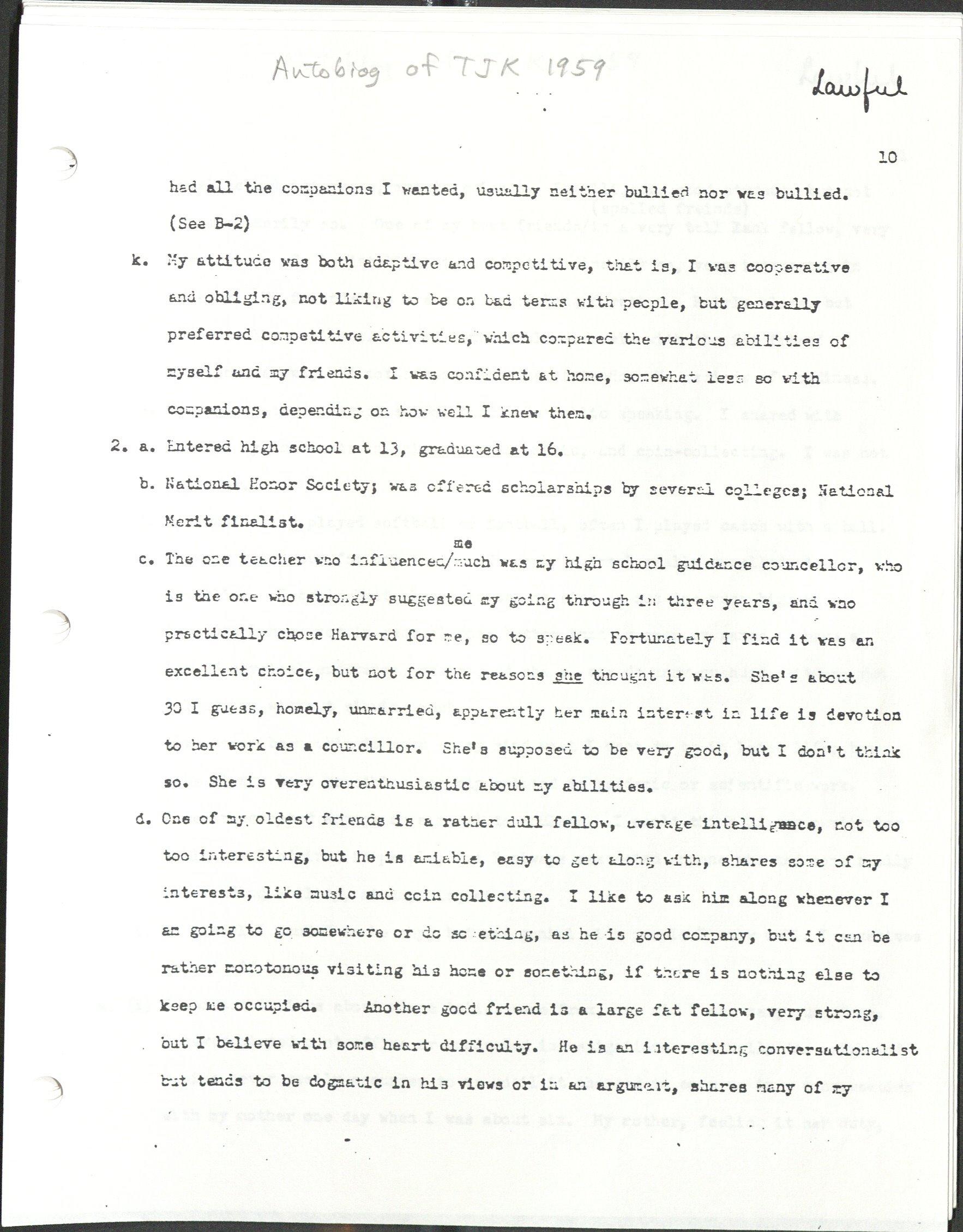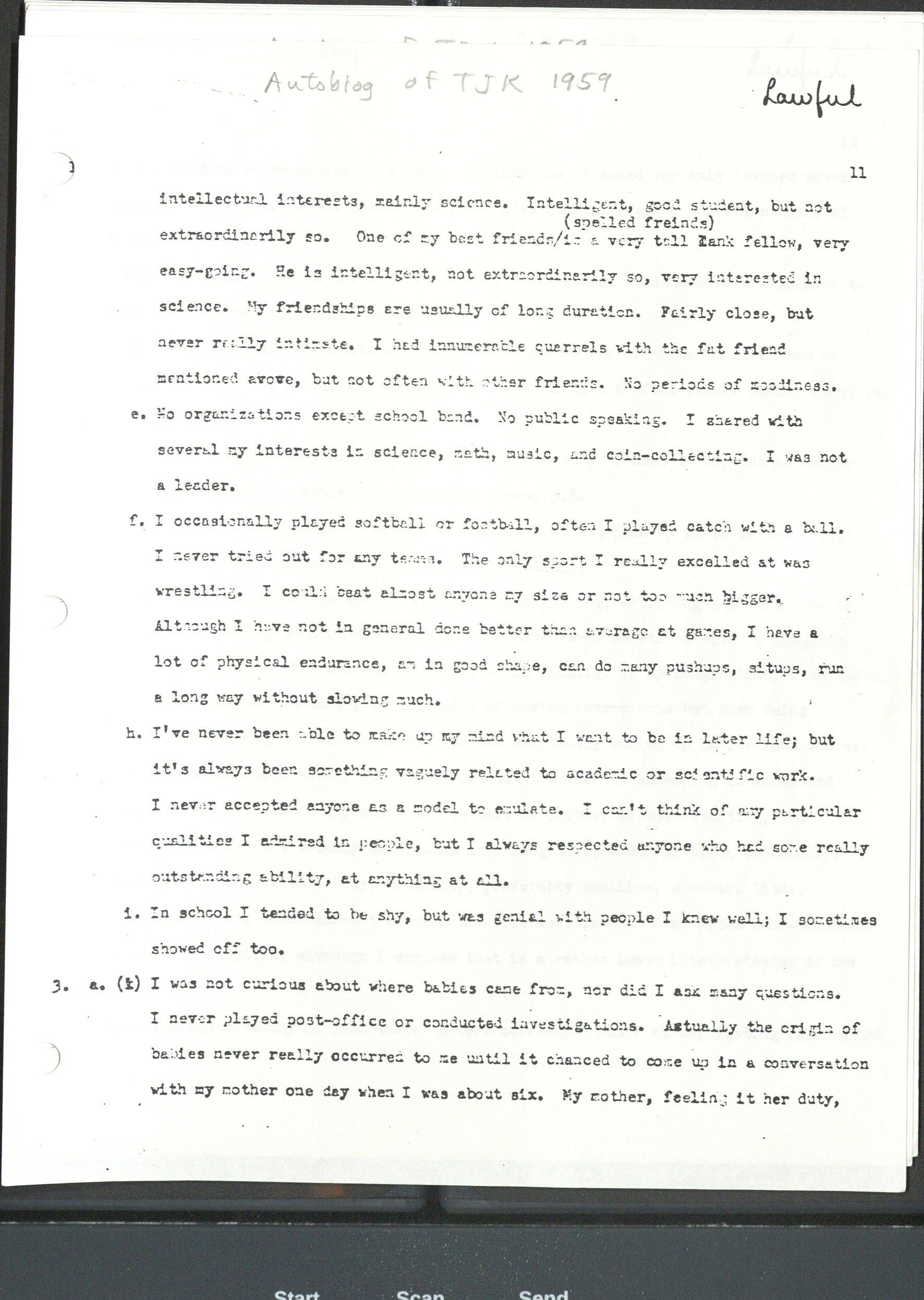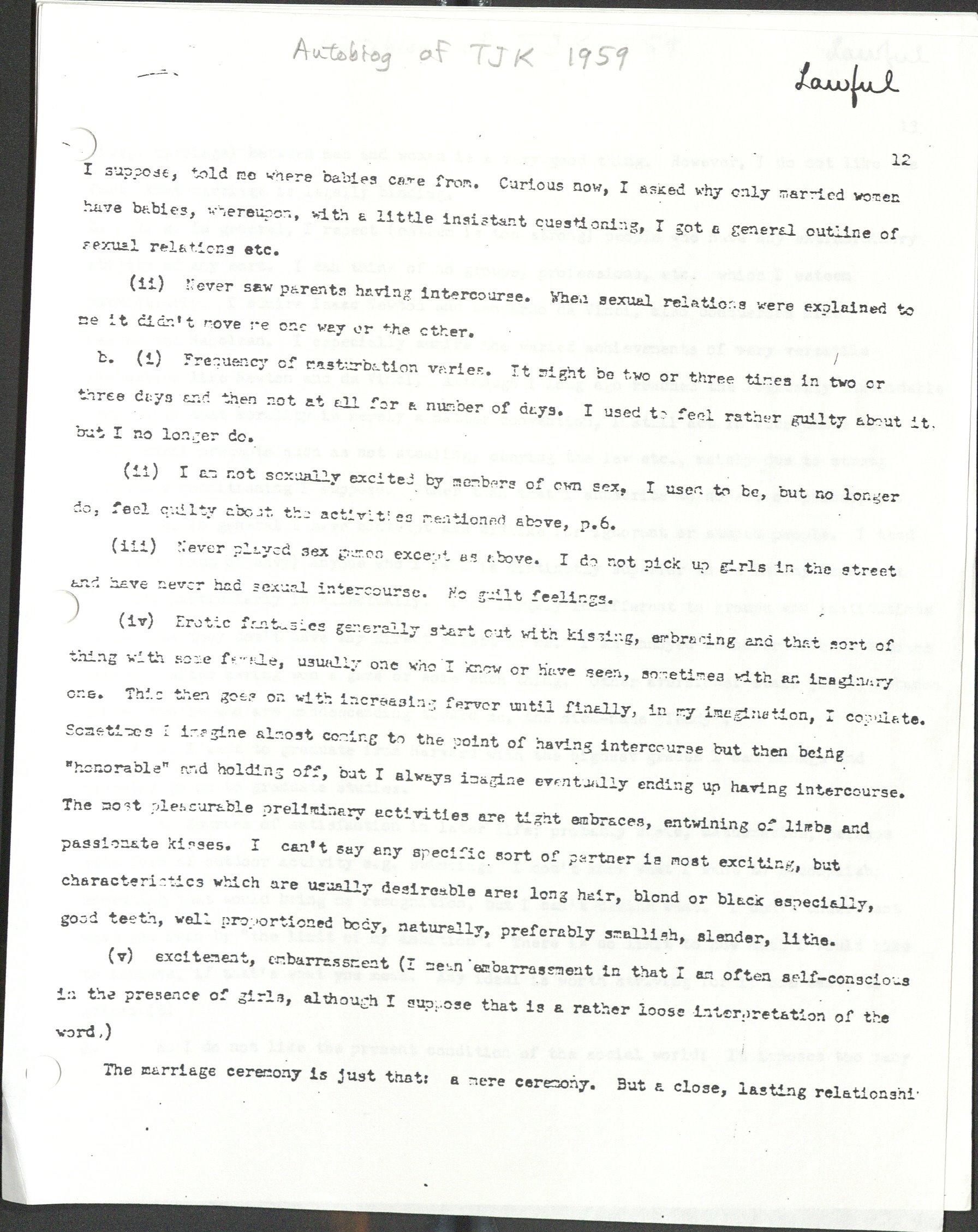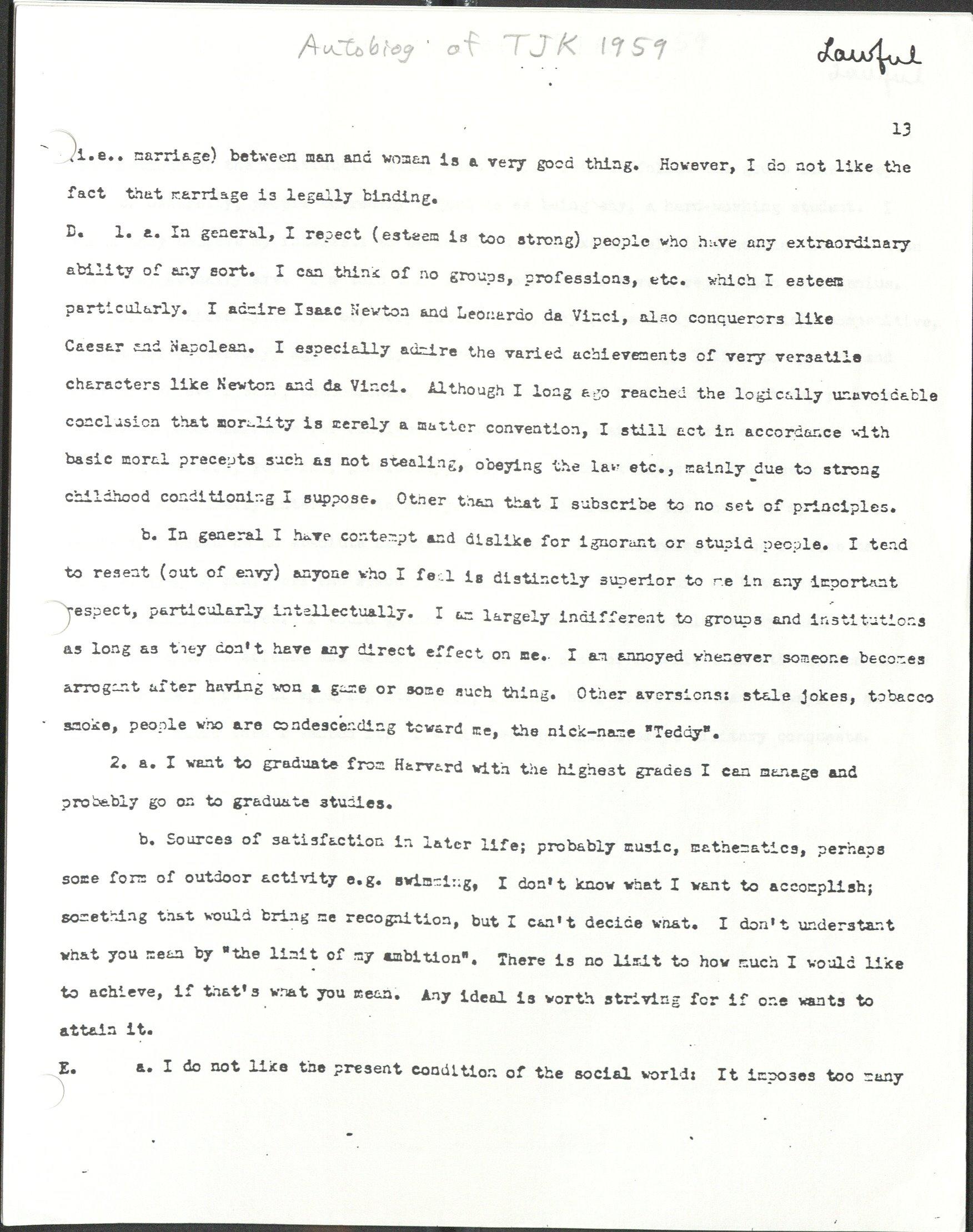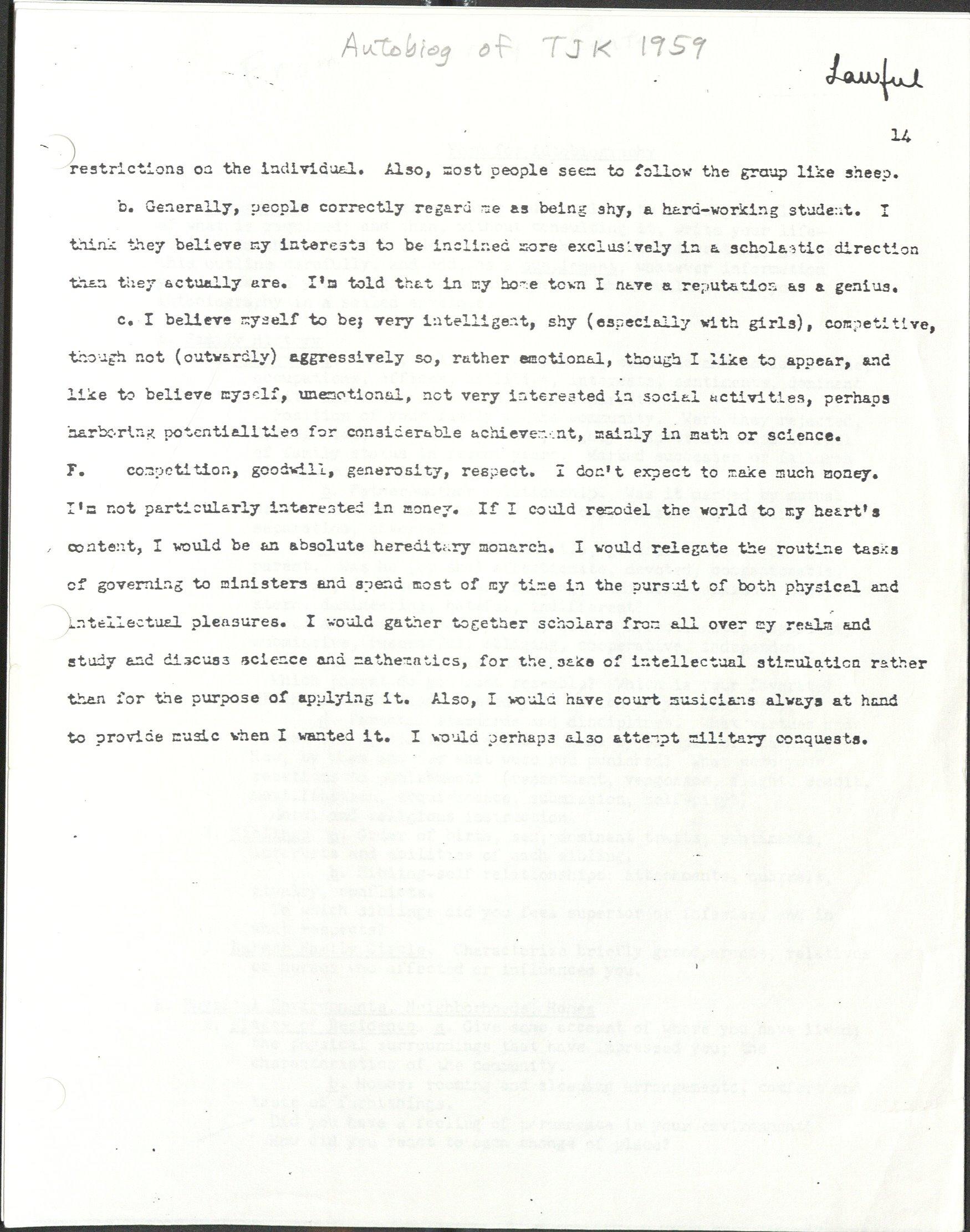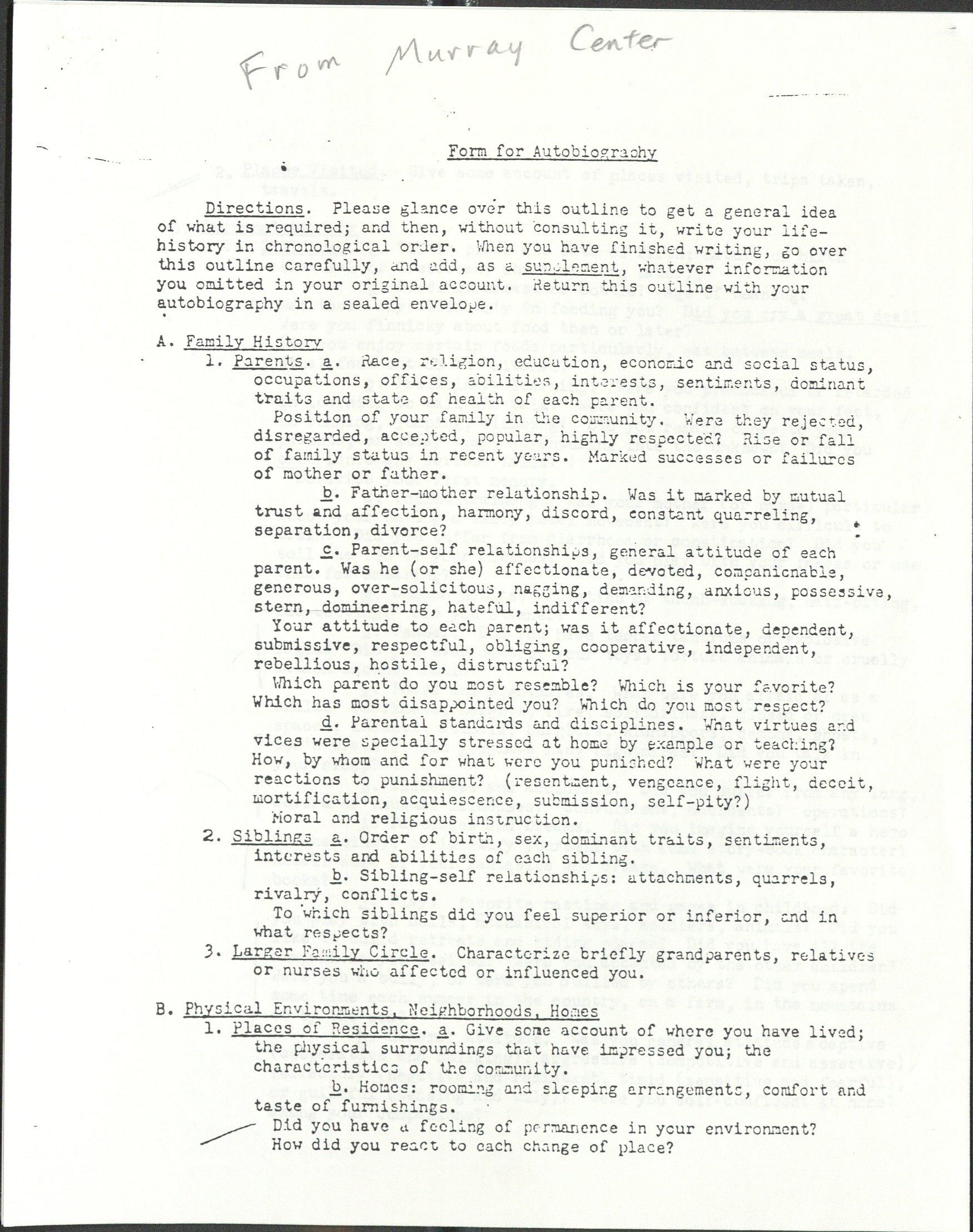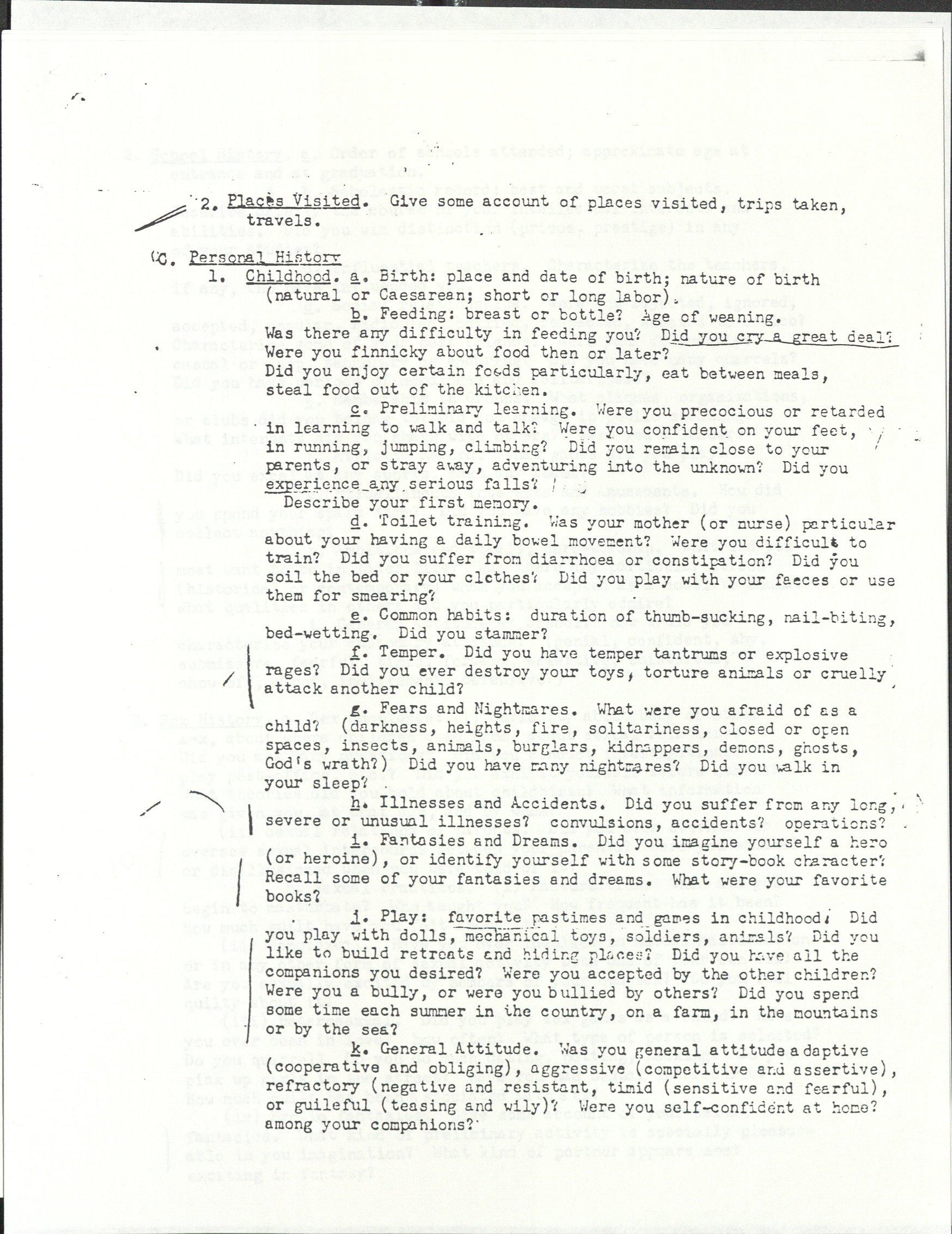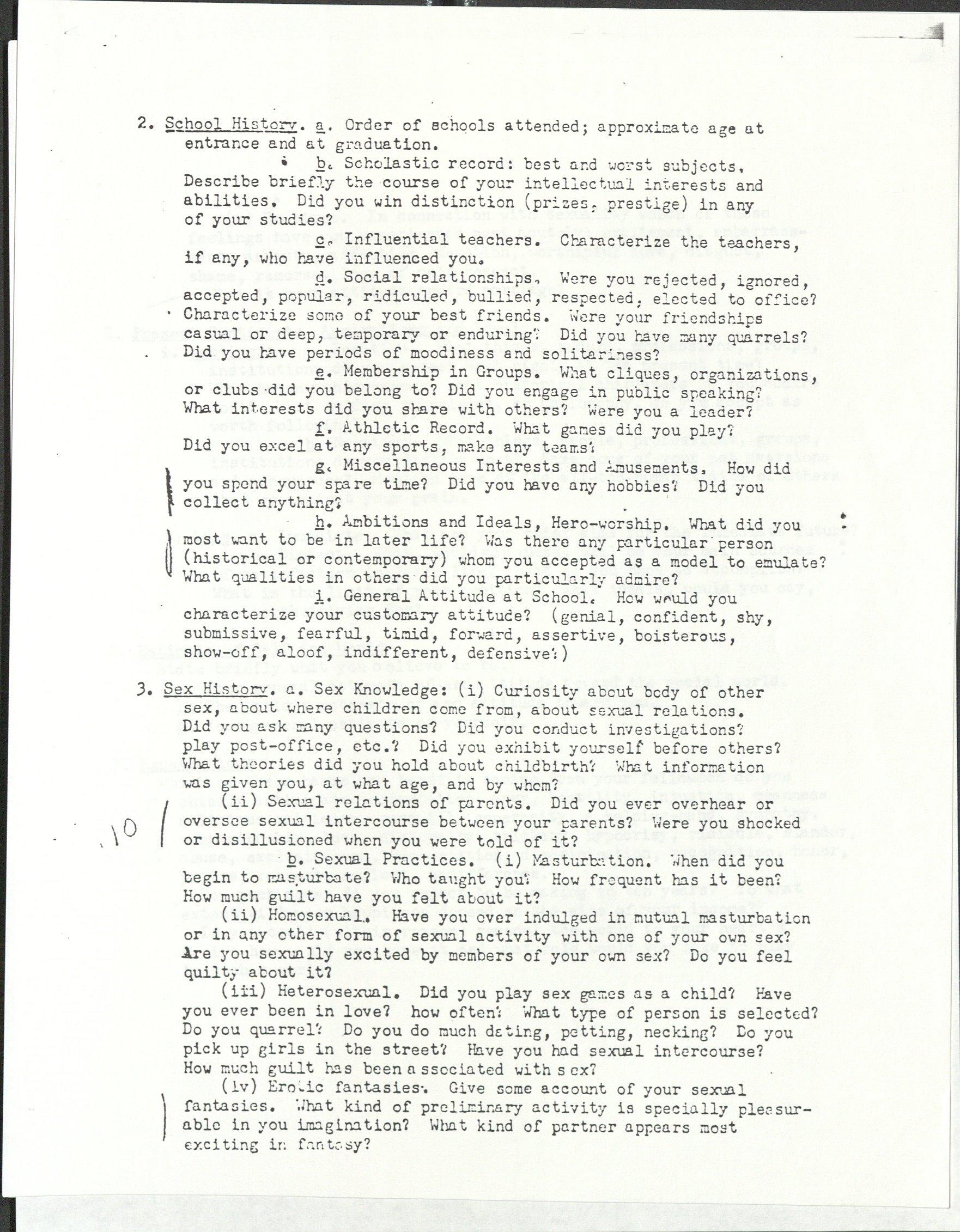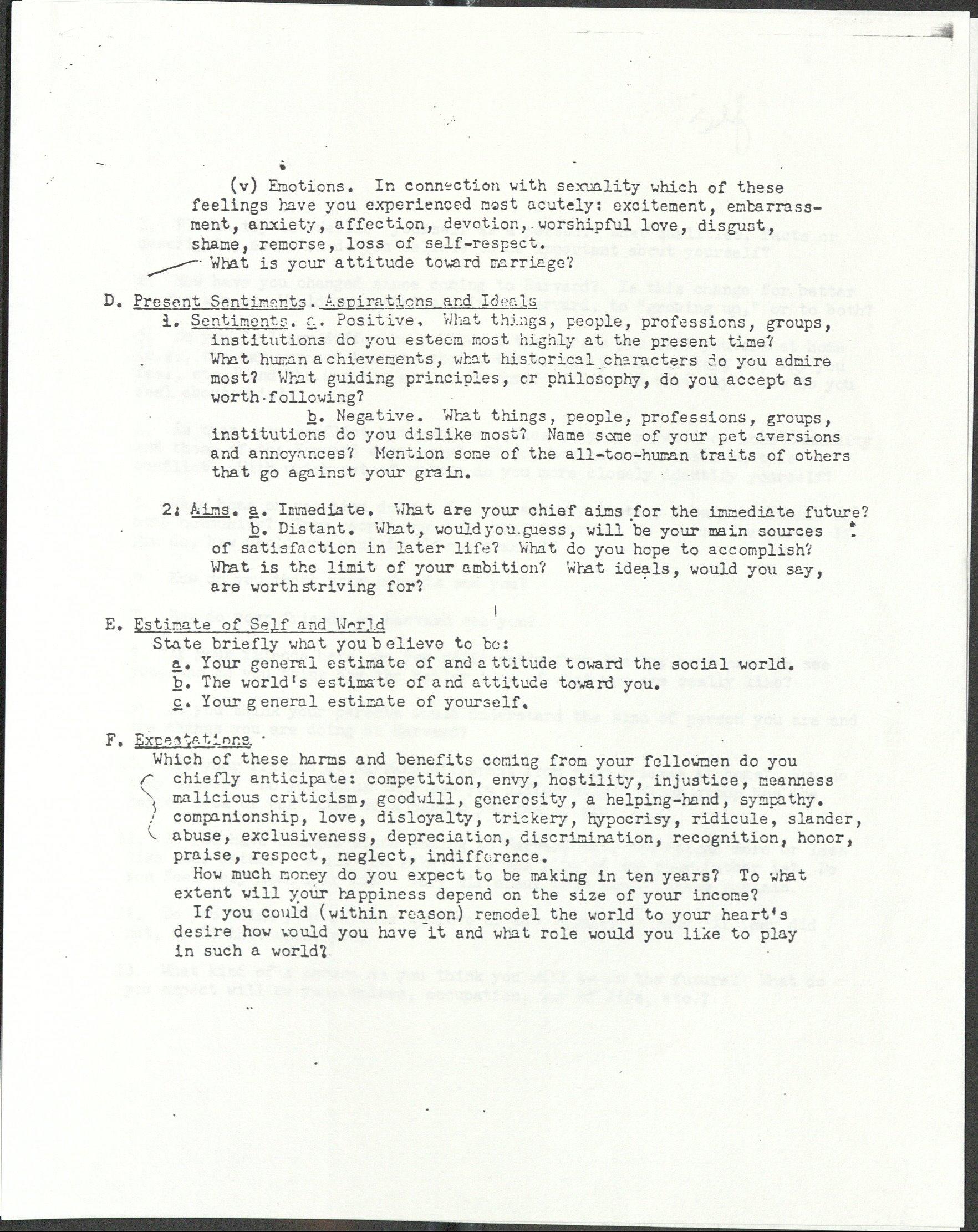Ted Kaczynski
Ted Kaczynski's 1959 Autobiography
1959
Information I forgot to include:
B. Physical Environments, Neighborhoods, Homes
Autobiog of TJK 1959. This is a brief autobiographical sketch that I wrote, probably in the fall of 1959, for Professor Henry A. Murray as part of a psychological study in which I participated. Its trustworthiness is impaired by the fact that I resented having been talked into participating in Murray’s study and therefore tried to avoid revealing too much about my inner self. I tended to downplay problems rather than speaking about them frankly; specifically, I understated the problems I had during adolescence with my parents and my school mates.
- Truth versus Lies
Autobiography/Lawful
I was born May 22, 1942. I don’t know much about my infancy. I have been told that I began to walk and talk somewhat, but not very, early. During my first few years I was rather sickly, constantly down with colds and other such ailments, but since the age of, I guess around 5 or 6 I have been quite healthy, perhaps because my tonsils were removed about this time. While I was still a baby, I’ve been told, I was hospitalized 3 times. Once I pulled a kettle of boiling water over myself. Another time I fell on my chin with my tongue between my teeth, splitting it into three parts longitudinally. At one tire I became covered all over with swelling or bumps of some sort. I was left in the hospital for a week, but the doctors did not know what caused it end sent me home because nothing could be done. However, ay mother, by experimentation, discovered that it was due to an allergy to eggs. When I ate eggs I would swell up. (I no longer have this allergy; eggs don’t bother me any more.)
I have several very early memories, but I don’t know which is the earliest. I suppose they are all from about the time I was 3 year’s old. One of these, I remember a wooden red toy firetruck of’ nine had a broken wheel, over which I was disturbed, but my father fixed it for me. Another tine, I remember I was very happy being carried on my father’s shoulders on a Sunday morning with bright sunlight coming in from the front windows. Another time, I remember I was digging through my box of wooden building blocks when I came across an old white paper lollipop-stick. I recalled at the time that my friend and I had often held such sticks in our mouths and pretended we were smoking cigarrettes, and I felt a nostalgic regret at the fact that there rarely seemed to be enough lollipop-sticks around these days with which to play "cigarrette"• As I said, I don’t know which of these memories is the earliest.
At that time I lived on the second story of a house in a Chicago neighborhood that I would now lock upon as slightly dingy.
As far as I can remember, I have always been socially reserved, and used to be rather unpleasantly conscious of the fact. For example, I remember that when I was very little, 3 or 4 years old, I was very concerned over the fact that when my mother bought me an icecream-cone, I was always afraid to take it directly from the lady’s hand; my mother had to take it from her and give it to me. Eventually I overcame this by forcing myself to take it directly. After a few times, it was easy. However, in the course of my life various other such things have bothered me; for example, I learned to whistle and to swim later than most of my companions, and I never did learn to skate. And it often bothered me that I was less socially active then the rest of the boys, which I think was partly due to shyness and partly due to a certain lack of interest in some of their activities. I’ve always kept to myself a lot.
When I was 4, we moved to another house, the first house my parents owned themselves. I started kindergarten not long after, at the age of 5. I cried once in a while during the first couple of weeks at being alone in a strange place, but I soon got over that. I did pretty well in school. I think it was in Second Grade that I got an "S" in Arithmetic, indicating "superior". This was a mark not ordinarily given in the grammar schools, but they gave it to me anyway, because I did so well. But in the 3rd grade (and every year up to 5th grade) I always had great difficulty with arithmetic, being slow and making many stakes. I was a very fast reader (I don’t mean I read fast particularly, but I learned to read quickly), generally the best in the class. I was resentfully, envious of the other good students, although I was convinced that I was basically smarter than they.
I was always rebellious toward parental control (although my parents were quite lenient) and often called my parents names and had big arguments with them. In general though our relationship was quite affectionate. In spite of my show of rebelliousness, I was basically very good; I never lied or stole or anything of that sort, my parents had indoctrinated me so thoroughly with such basic moral precepts that I adhered to them very strictly. My parents, though of Catholic backgrounds, are atheists, and, fortunately, never taught me to believe in God.
I was always academically an 1 scientifically Inclined. My enthusiasms for various branches of science ran in this order: Paleontology, Astronomy, Nuclear Physics, Anthropology (physical anthropology mainly, which I an still interested in), my finally, and apparently for good, Mathematics.
When I vaa about 10, we moved to Evergreen Park, a middle class suburb of Chicago, where most people make more money than my father, but few are wealthy. I entered 5th grade in the school there. After having taken an achievement test in reading, I came to Xhe attention of the guidance councillor, who gave me an I.Q. test which involved several sessions of testing, usually alone, sometimes with a couple of other boys, I think my score was something like 170. The next year I skipped sixth grade and went directly into seventh. I was, during the seventh grade, subject to a good deal of verbal abuse and teasing from the other boys, who I suppose were jealous. However I did make a couple of good friends among the better students, anti in subsequent years teasing dropped off a lot.
In 8th grade I gradually edged up my arithmetic grades until finally, in the last grading period, I got an A—.
I first masturbated at about 8 or 9, a little before we moved to Evergreen Pk. No one taught me, rather I discovered it myself. I did occasionally engage in masturbating and "stripping" with other boys (in Evergreen Park). This was an almost universal, or at least a very common practice, in my community, at least, though I don’t know whether it is generally or not. But it was generally not done after the age of 14 or 15 thereabouts.
In high school, I still had trouble with math. Although I got A in all my other subjects, I could not get more than a B for a final grade in mathematics, for my first year and a half. My councillors and parents said it was probably because it was too easy and I was bored with it. It is true that it bored me, and that I understood the principles easily, my difficulty being due to silly mistakes, but I think the difficulty was more due to lack of mental discipline than to boredom. In the last 3rd of my sophomore year, they put me in a trigonometry class, although I had missed the first part of the course and sophomores were not generally admitted. This was the first course in which mathematics became interesting to me. It was hard and forced re to discipline my Bind (which was used to getting A’s with very little work) to a certain extent. I barely got an A in the course. The next year I took "advanced mathematics* which was a smattering of all sorts of math, but mainly calculus. I now found math much more interesting, but was only able to get an A with great difficulty. At the beginning of the year I had still intended to go 1-to physics, but by the end of that course I was more inclined to mathematic ) At the suggestion of my councillors, I took a course in summer school, and an extra course in my third year, so that I was able to get through high school in three years.
In high school I had, I think, a measure of respect from perhaps half the students, I knew, while the others tended to treat me with a certain degree of contempt, for being one of the ’’brains in the school.
I played in the school band for a couple of years. My trombone teacher has told me several times that I have quite a bit of talent for the instrument, which I have played for 5 or six years. I enjoy music more and more as time passes.
I am an avid coin collector, specializing in U.S. coins.
I do not date or neck, mainly because of shyness, although girls find me attractive, I believe.
A’s for the last year or so, when I came to Harvard I was disillusioned and my ego was hurt, because all of a sudden, I was no longer smarter than everyone I knew. My counsellors had told me that I was a genius, but I found that if that were so, then there must be a great many genius’ about, I came here sure of getting all A’s and B’s, and mostly A’s. But I ended up my Freshman year (lest year) with only a C+, a B-, and two A’s, and that took quite a bit of effort. The grades were not bad, but I find that I am only better-then-average among Harvard students, except perhaps in mathematics courses, where I have, up to this point, gotten all A’s without a very great effort. Math courses are definitely my easiest courses at Harvard, which is directly opposite to the situation in high school and grammar school. Math continually interests me more and more.
My relationship with my parents used to be generally affectionate, but the last few years it has deteriorated considerably so that now we are on bad terms as often as good. I get fed up with their idiosyncrasies sometimes and I guess they get fed up with mine, and arguments develop. Up to quite recently however, I was very dependent on them in that I became unhappy if far away from then for any length of time, say a couple of days or more. Before coming to Harvard I was greatly afraid that I would suffer such from home sickness, but after a couple of weeks of unhappiness, this no longer bothered me at all. The ties seem to have been snapped completely, as it no longer bothers me at all to be away from home. In fact, I’m happier away from home, because I can be on very good terms with my parents through correspondence, but after I have been home for a week, or so, we begin to get on each others nerves and friction develops. Perhaps it is because my parents still want to play the dominant role in our relations, and control my behavior to a large extent, while I resent this because I consider myself in every way their intellectual superior. But I suppose I must admit that they are really in the right, as they are still supporting me. I like my parents both equally well, which is not really a great deal, but I respect my mother more than my father. My mother has what you might call an artist’s temperament, romantic, often deeply moved by a work of art; sometimes music, usually literature, my father enjoys literature superficially at least, and says Shakespeare was a great writer, as is proper for the intelligent liberal, but I doubt if he can really feel the passions expressed in a great piece of literature or music when he reads it or hears it. My mother, when she was young, had ambitions to become a writer, and has told me that she hated to settle down to the dreary task of becoming a housewife when she would have prefered to write. For her sake, I’m rather sorry she carried, as she might have actually contributed something to literature. Everything that she has written that I’ve seen seems very good, although I’m a poor judge of literature. My father, although he seems just as intelligent as my mother, is just her opposite in temperament, so it’s surprising that they get along with each other so well. My father is quite an extrovert, very social, likes to talk. His occupation. is making sausages. His main interests seem to be along the line of social problems and that sort of thing. He seems to have found some outlet for this in civic activities (in which my mother is also active) and has gained through them quite a bit of respect in the community (although he refuses to run for any office), and has been able to have considerable effect, in reforming school-board elections in the village. The only relative outside of the immediate family whom I’ve known at all well is my Uncle Ben. He’s sort of a screwball and I always enjoyed his company when I was younger because he would enter so actively into my play and was always so hilarious. But the last couple of years I haven’t cared for him so much any more. I don’t know whether It’s because he’s become more of a screwball or because I’ve just outgrown him, so to speak.
I do not think I have ever really been in love—actually, I have never known any girl very well. Of course I have indeed felt a physical desire for some particular girl over an extended period of time (in other words, a "crush"). This has happened often enough, but it is purely physical, so to speak, so you wouldn’t call it love.
Information I forgot to include:
A. 1. a. parents are white (polish)
Father’s education—high school
Mother’s education—2 yrs. college
My father is in generally good health. My mother has no known illnesses, but she does not look very fit and often complains of tiredness or other minor discomforts.
Status, lower middle class.
The family status has risen in the last few years due to both my parents’ civic activities. They are generally respected and liked in the community.
c. Father—affectionate, companionable, generous.
Mother—affectionate, generous, over-solicitous, nagging, anxious.
I resemble my father physically, my mother temperamentally.
d. I was punished by my father, in extreme cases by being hit with a belt or some such thing, but never more than two or 3 blows; generally by removing of privileges or personal property, the most common offense being rebelliousness. My reactions were resentment and self-pity.
2. a. Siblings—one brother, 10 yrs., bright, very good baseball player, very social an extrovert, much Like my father, more interested in sports and other social activities than in intellectual things.
b. My brother and I quarrel a lot, but when we’re not quarrelling we’re pretty friendly and considerate of each other. I feel superior to my brother in intellectual capacity, and very much in strength of will, even considering the age difference.
B. 1. a. The only physical surroundings near my home that ever impressed me were the prairies that used to exist in and-around Evergreen Park, and the wide spacing between the houses, before it was built up.
They gave a sense of freedom and openness.
b. My homes have always been tastefully, but never sumptuously furnished. I have always had a room to myself, as has my brother, while my parents slept together in a 3rd room. I don’t understand what is meant by a “feeling of permanence”. Whenever we moved, I tended to feel a nostalgic longing for the old home for a while (not very strongly).
2. The family often visited museums and the lixe. We usually took a trip during summer, not a long one, buz usually to nearby states like Michegan and Wisconsin genp.rally staying in or near wooded areas, eften camping out in a tent. Other than this Bort of tning I’ve done practically no travelling.
1. a. Natural birth at Lying-In Hospital, Chicago.
b. Both breast and bottle feeding. I don’t know about the rest, except that in later childhood I tended to be finicky about food for awhile, and I often eat between meals.
c. I have no knowledge of any of this except what I’ve already written.
d. My mother was not particular about my having a daily bowel movement. About the rest I have no knowledge (although I never had much trouble with bowel movements within my memory) except that I’ve been told that I was once found trying to eat my faeces out of my diaper.
e. I sucked my thumb for only a short time, I’m told. I never bit my nails until after my tenth year or so, when I bit them occasionally. I wet my bed occasionally until the age of four or five. Never stammered.
f. I often, or not too infrequently, anyway, used to cry and squall when angry and then go and hide myself and not let anyone talk to me for a while in order to make ay parents feel remorse for being so "unfair”.
I don’t Z -ow whether you class that us a temper tantrum or not. When I got into a rage it was generally something built up ever an extended period of quarrelling rather than explosive. Occasionally destroyed a toy, was gen t*r ally noted for kindness, especially to animals, not cruelty.
g. I was never afraid of individual insects, but I was often somewhat frightened by reading stories of ants in tropical countties w..ich come in hordes and are refuted to devour even men. I was sometimes afraid of the dark, but I don11 think any more than other children. I can’t think of any other irrational fears. I reldor. have had nightmares. I never walked in sy sleep.
h. Besides the accidents etc. already mentioned, I also had a congenital cyst removed from my upper jaw, a fairly minor operation.
i. I did like to imagine myself with any specific story-book character. I would often dream of attaining glory, fane, and recognition .for example, I would often dream of making sone great scientific discovery. Or of attaining glory in some more adventurous manner, such as in war. After reading a story I often liked to daydream of what I would do if I were in the hero’s place, how I would correct his Mistakes. Ky favorite books have always been adventure bocks, where the plot moves quickly and something or other is always happening, e.g. Treasure Island, Thu Three Muskctteers, Scurasouche, almost any sort of science fiction, Jack London’s books.
j. One of my favorite pastimes was building large, complex, structures cut of wooden blocks. I also liked to play with cy chemistry set; I did nothing scientific; I merely mixed things together to see what would happen. I loved to hike in the woods end plr.y in the water at beaches, also to cllab trees, wrestle. I like any sort of card game, checkers, chess. Didn’t build hiding places. Usually had all the companions I wanted, usually neither bullied nor was bullied. (See B-2)
k. My attitude was both adaptive and competitive, that is, I was cooperative and obliging, not liking to be on bad terms with people, but generally preferred competitive activities, which compared the various abilities of myself and my friends. I was confident at home, somewhat less so with companions, depending on how well I knew them.
2a. Entered high school at 13, graduated at 16.
b. National Eonor Society; was offered scholarships by several colleges; National Merit finalist.
c. The one teacher woo influenced me much was my high school guidance councellor, who is the one who strongly suggested my going through in three years, and who practically chose Harvard for me, so to speak. Fortunately I find it was an excellent choice, but not for the reasons she thought it was. She’s about 30 I guess, homely, unmarried, apparently her main interest in life is devotion to her work as a councillor. She’s supposed to be very good, but I don’t think so. She is very overenthusiastic about my abilities.
d. One of my oldest friends is a rather dull fellow, average intelligence, not too interesting, but he is amiable, easy to get along with, shares some of my interests, like music and coin collecting. I like to ask him along whenever I am going to go somewhere or do something, as he is good company, but it can be rather monotonous visiting his hone or something, if there is nothing else to keep us occupied. Another good friend is a large fat fellow, very strong, but I believe with some heart difficulty. He is an interesting conversationalist but tends to be dogmatic in his views or in an argument, shares many of my intellectual interests, mainly science. Intelligent, good student, but not extraordinarily so. One of my best friends is a very tall lank fellow, very easy-going. He is intelligent, not extraordinarily so, very interested in science. My friendships are usually of long duration. Fairly close, but never really intimate, I had innumerable quarrels with the fat friend mentioned above, but not often with other friends. No periods of moodiness
e. No organizations except school band. No public speaking. I shared with several my interests in science, math, music, and coin-collecting. I was not a leader.
f. I occasionally played softball or football, often I played catch with a ball. I never tried out for any teams. The only sport I really excelled at was wrestling. I could beat almost anyone my size or not too much bigger.
Although I have not in general done better than average at games, I neve a lot of physical endurance, am in good shape, can do many pushups, situps, run a long vray without slowing much.
h. I’ve never been able to take up my mind what I went to be in later life; but it’s always been something- vaguely related to academic or scientific work. I never accepted anyone as a model to emulate. I can’t think of any particular qualities I admired in people, but I always respected anyone who had sor.e really outstanding ability, at anything at all.
i. In school I tended to be shy, but was genial with people I knew well; I sometimes showed off too,
3. a. (i) I was not curious about where babies came from, nor did I ask many questions. I never played post-office or conducted investigations. Actually the origin of babies never really occurred to me until it chanced to come up in a conversation with my mother one day when I was about six. My mother, feelinj it her duty, I suppose, told fjc where babies c«me from. Curious now, I asx.ed why only married women have babies, whereupon, with a little insistant questioning, I got a general outline of sexual relationa etc.
(ii) Never saw parents having intercourse. When sexual relations were explained to me it didn’t rove re one way or the other.
b. (i) frequency of masturbation varies. It right be two or three tir.es in two or three days and then not at all for a number of days. I used t? feci rather guilty about it. but I no longer do.
(ii) I am not sexually excited by members of own sex. I usee to be, but no longer do. feel cuilty about the aetivlt’es mentioned above, p.6.
(iii) fever played sex pur. on except bs above. I do not pick up girls in the street and have never had sexual intercourse. Ho guilt feelings.
(iv) Erotic fantasies generally start cut with kiscing, embracing and that sort of thing with some f^ale, usually one who I know or have seen, sometimes with an imaginary one. This then goes on with increasing fervor until finally, in my imeginatdon, I copulate. Sometimes I ir.?gine almost coring to the point of having intercourse but then being **honorable" nnd holding off, but I always imagine even tidily ending up having intercourse. The most pleasurable preliminary activities are tight embraces, entwining of lircbs and passionate kisses. I can’t say any specific sort of partner ia most exciting, but characteristics which are usually desireable are: long hair, blond or black especially, good teeth, well proportioned body, naturally, preferably smallish, slender, lithe.
(v) excitement, embarrassment (I mean'embarrassment in that I am often self-conscious in the presence of girls, although I suppose that is a rather loose interpretation of the word,)
The marriage ceremony is just that: a mere ceremony. But a close, lasting relationship. i.e. marriage between man and woman is a very good thing. However, I do not like the fact that carriage is legally binding.
D. 1. a. In general, I respect (esteem is too strong) people who have any extraordinary ability of any sort. I can think of no groups, professions, etc. which I esteem particularly. I admire Isaac Newton and Leonardo da Vinci, also conquerors like Caesar and biapolean. I especially admire the varied achievements of very versatile characters like Newton and da Vinci. Although I long ago reached the logically unavoidable conclusion that morality is merely a matter convention, I still act in accordance with basic moral precepts such as not stealing, obeying the law etc., mainly due to strong childhood conditioning I suppose. Other than that I subscribe to no set of principles.
b. In general I have contempt and dislike for ignorant or stupid people. I tend to resent (out of envy) anyone who I feel is distinctly superior to r.e in any important yespect, particularly intellectually. I am largely indifferent to groups and Institutions as long as tiey don’t have any direct effect on me.- I am annoyed whenever someone becomes arrogant after having won a game or some such thing. Other aversions: stale jokes, tobacco smoke, people wno are condescending toward me, the nick-name "Teddy8.
2. a. I want to graduate from Harvard with the highest grades I can manage and probably go on to graduate studies.
b. Sources of satisfaction in later life; probably music, mathematics, perhaps some form of outdoor activity e.g. swimming, I don’t know what I want to accomplish; something that would bring me recognition, but I can’t decide what. I don’t understand what you mean by "the limit of my ambition". There is no limit to how much I would like to achieve, if that’s what you mean. Any ideal is worth striving for if one wants to attain it.
E. a. I do not like the present condition of the social world: It imposes too many restrictions on the individual. Also, most people seem to follow the group like sheep.
b. Generally, people correctly regard me as being shy, a hard-working student. I think they believe my interests to be inclined sore exclusively in a scholastic direction than they actually ere. I’m told that in my home town I nave a reputation as & genius.
c. I believe myself to be very intelligent, shy (especially with girls), competitive, though not (outwardly) aggressively so, rather emotional, though I like to appear, and like to believe myself, unemotional, not very interested in social activities, perhaps harboring potentialities for considerable achiever.-mt, mainly in math or science.
F. competition, goodwill, generosity, respect. I don’t expect to make such money. I’m not particularly interested in money. If I could remodel the world to my heart’s content, I would be an absolute hereditary monarch. I would relegate the routine tasks of governing to ministers and spend most of my time in the pursuit of both physical and intellectual pleasures. I would gather together scholars from all over my realm and study and discuss science and mathematics, for the sake of intellectual stimulation rather than for the purpose of applying it. Also, I would have court musicians always at hand to provide music when I wanted it. I would perhaps also attempt military conquests.
Form for Autobiography
Directions. Please glance over this outline to get a general idea of what is required; and then, without consulting it, write your life- history in chronological order. When you have finished writing, go over this outline carefully, and add, as a supplement, whatever information you omitted in your original account. Return this outline with your autobiography in a sealed envelope.
A. Family History
1. Parents, a. Race, religion, education, economic and social status, occupations, offices, abilities, interests, sentiments, dominant traits and state of health of each parent.
Position of your family in the community. Were they rejected, disregarded, accepted, popular, highly respected? Rise or fall of family status in recent years. Marked successes or failures of mother or father.
b. Father-mother relationship. Was it marked by mutual trust and affection, harmony, discord, constant quarreling, separation, divorce?
c. Parent-self relationships, general attitude of each parent. Was he (or she) affectionate, devoted, companionable, generous, over-solicitous, nagging, demanding, anxious, possessive, stern, domineering, hatefúl, indifferent?
Your attitude to each parent; was it affectionate, dependent, submissive, respectful, obliging, cooperative, independent, rebellious, hostile, distrustful?
Which parent do you most resemble? Which is your favorite? Which has most disappointed you? Which do you most respect?
d. Parental standards and disciplines. What virtues and vices were specially stressed at home by example or teaching? How, by whom and for what were you punished? What were your reactions to punishment? (resentment, vengeance, flight, deceit, mortification, acquiescence, submission, self-pity?) Moral and religious instruction.
2. Siblings a. Order of birth, sex, dominant traits, sentiments, interests and abilities of each sibling.
b. Sibling-self relationships: attachments, quarrels, rivalry, conflicts.
To which siblings did you feel superior or inferior, and in what respects?
3. Larger Family Circle. Characterize briefly grandparents, relatives or nurses who affected or influenced you.
B. Physical Environments, Neighborhoods, Homes
1. Places of Residence, a,. Give sone account of where you have lived; the physical surroundings that have impressed you; the characteristics of the community.
b. Homes: rooming and sleeping arrangements, comfort and taste of furnishings.
Did you have a feeling of permanence in your environment?
How did you react to each change of place?
2. Places Visited. Give some account of places visited, trips taken, travels.
C. Personal History
1. Childhood
a. Births place and date of birth; nature of birth (natural or Caesarean; short or long labor)!
b. Feeding: breast or bottle? Age of weaning.
Was there any difficulty in feeding you? Did you crv-a great deal? p ’ Were you finhicky about food then or later?
Did you enjoy certain foods particularly, eat between meals, steal food out of the kitchen.
c. Preliminary learning. Were you precocious or retarded in learning to walk and talk? Were you confident on your feet, \j ' w in running, jumping, climbing? Did you remain close to your parents, or stray away, adventuring into the unknown? Did you experience_any,serious falls? /} Q Describe your first memory.
d. Toilet training. Was your mother (or nurse) particular about your having a daily bowel movement? Were you difficult to train? Did you suffer from diarrhoea or constipation? Did you soil the bed or your clothes? Did you play with your faeces or use them for smearing?
e. Common habits: duration of thumb-sucking, nail-biting, bed-wetting. Did you stammer?
f. Temper. Did you have temper tantrums or explosive rages? Did you ever destroy your toys, torture animals or cruelly attack another child?
g. Fears and Nightmares. What were you afraid of as a child? (darkness, heights, fire, solitariness, closed or open spaces, insects, animals, burglars, kidnappers, demons, ghosts, God’s wrath?) Did you have many nightmares? Did you walk in your sleep?
h. Illnesses and Accidents. Did you suffer from any long, severe or unusual illnesses? convulsions, accidents? operations?
i. Fantasies and Dreams. Did you imagine yourself a hero ((or heroine), or identify yourself with some story-book character? Recall some of your fantasies and dreams. What were your favorite books?
j. Play: favorite pastimes and games in childhood: Did you play with dolls, me’cHanical toys, soldiers, animals? Did you like to build retreats and hiding places? Did you have all the companions you desired? Were you accepted by the other children? Were you a bully, or were you bullied by others? Did you spend some time each summer in ihe country, on a farm, in the mountains or by the sea?
k. General Attitude. Was you general attitude a daptive (cooperative and obliging), aggressive (competitive and assertive), refractory (negative and resistant, timid (sensitive and fearful), or guileful (teasing and wily)? Were you self-confident at hone? among your companions?'
2. School History.
a. Order of schools attended; approximate age at entrance and at graduation.
b. Scholastic record: best and worst subjects. Describe briefly the course of your intellectual interests and abilities. Did you win distinction (prizesr prestige) in any of your studies?
c. Influential teachers. Characterize the teachers, if any, who have influenced you.
d. Social relationships, Were you rejected, ignored, accepted, popular, ridiculed, bullied, respected, elected to office? Characterize some of your best friends. Were your friendships casual or deep, temporary or enduring? Did you have many quarrels? Did you have periods of moodiness and solitariness?
e. Membership in Groups. What cliques, organizations, or clubs -did you belong to? Did you engage in public speaking? What interests did you share with others? Were you a leader?
f. Athletic Record. What games did you play? Did you excel at any sports, make any teams?
g. Miscellaneous Interests and Amusements. How did I you spend your spare time? Did you have any hobbies? Did you collect anything?
h. Ambitions and Ideals, Hero-worship. What did you most want to be in later life? Was there any particular’person (historical or contemporary) whom you accepted as a model to emulate? What qualities in others did you particularly admire?
i. General Attitude at School. How would you characterize your customary attitude? (genial, confident, shy, submissive, fearful, timid, forward, assertive, boisterous, show-off, aloof, indifferent, defensive?)
3. Sex History
a. Sex Knowledge:
(i) Curiosity about body of other sex, about where children come from, about sexual relations. Did you ask many questions? Did you conduct investigations? play post-office, etc.? Did you exhibit yourself before others? What theories did you hold about childbirth? What information was given you, at what age, and by whom?
(ii) Sexual relations of parents. Did you ever overhear or oversee sexual intercourse between your parents? Were you shocked or disillusioned when you were told of it?
b. Sexual Practices
(i) Masturbation. When did you begin to masturbate? Who taught you? How frequent has it been? How much guilt have you felt about it?
(ii) Homosexual,. Have you over indulged in mutual masturbation or in any other form of sexual activity with one of your own sex? Are you sexually excited by members of your own sex? Do you feel quilty about it?
(iii) Heterosexual. Did you play sex games as a child? Have you ever been in love? how often? What type of person is selected? Do you quarrel? Do you do much dating, petting, necking? Do you pick up girls in the street? Have you had sexual intercourse? How much guilt has been associated with sex?
(iv) Erotic fantasies-. Give some account of your sexual fantasies. What kind of preliminary activity is specially pleasurable in you imagination? What kind of partner appears most exciting in fantasy?
(v) Emotions. In connection with sexuality which of these feelings have you experienced most acutely: excitement, embarrassment, anxiety, affection, devotion,.worshipful love, disgust, shame, remorse, loss of self-respect.
What is your attitude toward marriage?
D. Present Sentiments. Aspirations and Ideals
1. Sentiments
a. Positive. What things, people, professions, groups, institutions do you esteem most highly at the present time? What human achievements, what historical characters do you admire most? What guiding principles, or philosophy, do you accept as worth following?
b. Negative. What things, people, professions, groups, institutions do you dislike most? Name some of your pet aversions and annoyances? Mention some of the all-too-human traits of others that go against your grain.
2. Aims
a. Immediate. What are your chief aims for the immediate future?
b. Distant. What, would you. guess, will be your main sources of satisfaction in later life? What do you hope to accomplish? What is the limit of your ambition? What ideals, would you say, are worth striving for?
E. Estimate of Self and World
State briefly what you believe to be:
a. Your general estimate of and attitude toward the social world.
b. The world’s estimate of and attitude toward you,
c. Your general estimate of yourself.
F. Expectations
Which of these harms and benefits coming from your fellowmen do you chiefly anticipate: competition, envy, hostility, injustice, meanness, malicious criticism, goodwill, generosity, a helping-hand, sympathy, companionship, love, disloyalty, trickery, hypocrisy, ridicule, slander, A abuse, exclusiveness, depreciation, discrimination, recognition, honor, praise, respect, neglect, indifference.
How much money do you expect to be making in ten years? To what extent will your happiness depend on the size of your income?
If you could (within reason) remodel the world to your heart’s desire how would you have it and what role would you like to play in such a world?
Source
